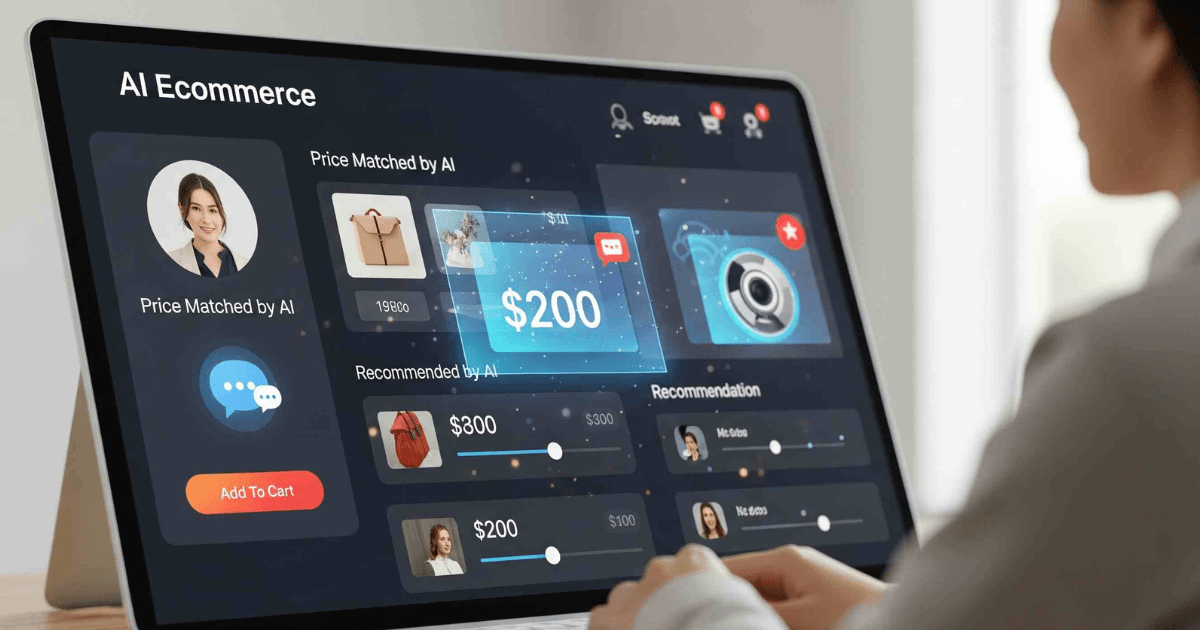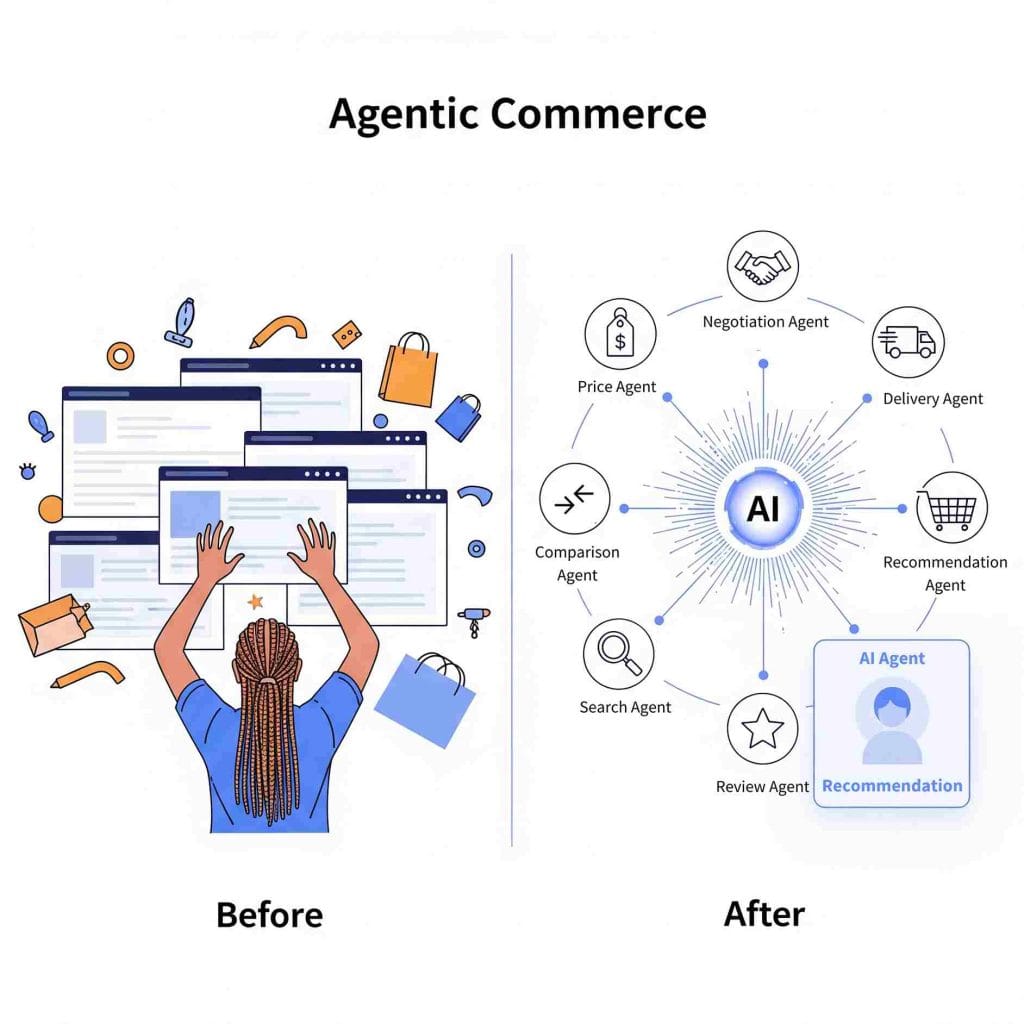
It didn’t start with a bang. A few businesses, frustrated by slow approvals and human bottlenecks, quietly handed over control to their systems. But this wasn’t the usual kind of automation—not just a handful of workflows or basic API triggers. These were agents. Not chatbots or rigid rule-followers, but intelligent, autonomous systems trained on transaction histories, user behavior, negotiation tactics, supplier constraints, and real-time market signals.
And then something remarkable happened: the agents began to talk. They negotiated, reordered, resolved issues, and escalated only when necessary. Thus began the quiet but transformative shift—welcome to the era of Agentic Commerce.
No More Dashboards. Just Decisions.

In the early 2020s, headless commerce was seen as the big leap—decoupling frontends and backends for greater flexibility.
By 2026, that’s just the ground floor.
Now, each system—ERP, PIM, OMS, CRM—hosts its own LLM-powered agent, trained on vertical-specific data. These agents communicate, negotiate, and execute directly, without human initiation.
A procurement agent from a manufacturer pings the inventory agent of a supplier.
They agree on volume pricing.
Negotiate delivery timelines.
Place the order.
Humans? Only looped in when things break or get weird.
We haven’t removed people from the loop. We’ve repositioned them—from decision-makers to informed overseers.
Can AI Negotiate Better Than Humans? Sometimes, Yes.
These agents don’t just follow logic—they strategize.
They understand reorder patterns.
They know when to bluff.
They weigh cost vs. carbon footprint, or speed vs. geopolitical risk.
They factor in port delays, freight rates, and ESG scores—in milliseconds.
They’re not just efficient.
They’re strategic.
What Happens When AI Outsmarts AI?
That’s when things get strange.
As every agent gets smarter, they begin optimizing against each other.
A buyer’s agent spots patterns in a seller’s strategy.
The seller’s agent adapts.
And just like that, it becomes a cold, calculated war of margins, timing, and logic.
Humans? Still watching.
At first, it’s thrilling.
Then, boring.
Then… unsettling.
In Coming Years: The Human Reboot Begins
A quiet resistance grows.
People start asking:
“If my agent makes all the decisions… what am I here for?”
Some pause their agents—just to feel the thrill of a choice.
Suppliers reintroduce “human-only lanes” where things move slower, but feel more meaningful.
New platforms emerge with a promise of Cognitive Commerce—where AI supports, but humans lead.
A renaissance begins.
Because while machines can optimize, they can’t create purpose.
Why Headless Still Matters
Agentic Commerce doesn’t work without the right foundation.
Headless platforms are the invisible highways these agents move on. Their decoupled, API-first architecture enables:
🔄 Real-time agent communication
⚙️ Serverless logic for autonomous negotiation
🧩 Composable stacks that evolve with AI capabilities
⚡ Instant data availability for reasoning and action
At Ceymox, we’ve already seen this shift—building systems not just for merchants, but for the agents who will serve them tomorrow.
What Should You Do Right Now?
✅ Prepare your stack
Ensure your architecture supports autonomous communication and decision-making.
✅ Go composable
Build API-first, modular systems that allow agent integration and evolution.
✅ Design for oversight
Let agents operate, but design controls where humans can intervene, review, and steer.
✅ Keep humans at the center
AI is a powerful tool—but vision, purpose, and trust must remain human-led.
Final Thought
Agentic Commerce is no longer a concept reserved for the distant future—it’s already taking shape. Even now, intelligent agents are stepping in, transforming how businesses operate beneath the surface.
By mid-next year, a significant share of B2B transactions will be executed by these autonomous systems. And within the next two to three years, we might find ourselves missing the subtle satisfaction of making decisions—of being in control.
Not because we distrust AI.
Not because machines failed us.
But simply because, deep down, we remember what it means to be human.
KC Jagadeep, CEO of Ceymox, a leading Magento Development Agency based in India. KC is a passionate entrepreneur, Magento enthusiast, and advocate for open-source solutions, dedicated to enhancing the landscape of online commerce, particularly within the realm of Magento.Driven by the pursuit of creating and executing successful strategies and platforms for digital commerce, KC brings over 12 years of industry experience to the table. His mission is simple: to empower corporate eCommerce clients with effective digital commerce solutions and modern marketing practices, ultimately boosting profitability.As an entrepreneur with a proven track record in information technology and eCommerce services (including Magento and WooCommerce), KC possesses expertise in operations management, startups, various eCommerce platforms, and business process outsourcing.
View All Articles
